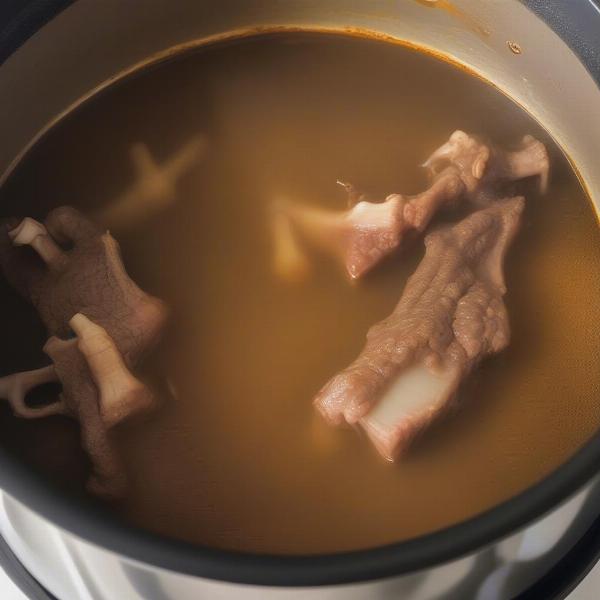Beef bones can be a tempting treat for your furry friend, but are they safe? This comprehensive guide explores the benefits and risks of giving beef bones to dogs, helping you make informed decisions about their diet. We’ll cover types of bones, potential hazards, and safe alternatives, ensuring your dog enjoys a healthy and happy life.
Understanding the Appeal of Beef Bones for Dogs
Dogs are naturally drawn to bones, enjoying the chewing action and the satisfying flavor. Chewing also helps to clean their teeth and massage their gums. However, not all bones are created equal, and some can pose serious health risks. It’s crucial to understand the difference between safe and unsafe bones for your canine companion.
Safe Beef Bones for Dogs: Making the Right Choices
While some beef bones are definitely off-limits, others can be offered with careful supervision. Raw beef bones, particularly meaty rib bones or knuckle bones, can be a good source of nutrients and provide mental stimulation. beef rib bones for dogs These should always be given raw and never cooked, as cooking makes them brittle and prone to splintering.
The Dangers of Cooked Beef Bones: Why They’re a No-Go
Cooked beef bones, including those leftover from your dinner, are extremely dangerous for dogs. The cooking process alters the bone’s structure, making it hard and easily shattered. These sharp splinters can cause a range of problems, from choking and mouth injuries to internal damage. Never give your dog cooked beef bones, no matter how tempting they may seem.
Alternatives to Beef Bones: Safe and Satisfying Chews
If you’re concerned about the risks of beef bones, there are plenty of safe and satisfying alternatives. These include specially designed dog chews made from durable rubber, nylon, or other safe materials. Look for chews that are appropriately sized for your dog to prevent choking hazards.
Beef Bone Broth for Dogs: A Nutritious and Delicious Treat
beef bone broth for dogs is a nutritious and flavorful addition to your dog’s diet. It’s packed with essential minerals and can support joint health, digestion, and a healthy coat. You can make your own bone broth using raw beef bones or purchase pre-made broth specifically formulated for dogs.
Recognizing Signs of Trouble: When to Seek Veterinary Care
Even with careful supervision, accidents can happen. It’s essential to recognize the signs that your dog may have ingested a bone fragment or is experiencing digestive distress. These signs can include vomiting, diarrhea, constipation, abdominal pain, and lethargy. If you notice any of these symptoms, contact your veterinarian immediately.
Beef Neck Bones for Dogs: A Safe Option?
beef neck bones for dogs can be a good option for dogs, but, like other raw bones, should be given under supervision. They are generally softer than other types of bones and less likely to splinter. However, it’s important to choose the right size for your dog to prevent choking.
Making Homemade Beef Bone Broth: A Step-by-Step Guide
beef bone broth for dogs recipe is easy to make at home. Simply simmer raw beef bones in water with a splash of apple cider vinegar for 12-24 hours. The vinegar helps to extract nutrients from the bones. Once cooled, strain the broth and store it in the refrigerator.  Homemade Beef Bone Broth
Homemade Beef Bone Broth
Conclusion: Balancing Benefits and Risks with Beef Bones for Dogs
Beef bones can offer some benefits for dogs, but it’s crucial to understand the risks involved. By choosing raw, meaty bones, supervising your dog closely, and opting for safe alternatives when necessary, you can ensure your furry friend enjoys a healthy and enjoyable chewing experience.
FAQ
- Can I give my dog cooked beef bones? No, cooked beef bones are dangerous and should never be given to dogs.
- What are some safe alternatives to beef bones? Safe alternatives include rubber chews, nylon bones, and rope toys.
- How can I make beef bone broth for my dog? Simmer raw beef bones in water with apple cider vinegar for 12-24 hours.
- What should I do if my dog swallows a bone fragment? Contact your veterinarian immediately.
- Are beef neck bones safe for dogs? Yes, under supervision, as they are generally softer and less likely to splinter.
- What are the signs of digestive distress in dogs? Vomiting, diarrhea, constipation, abdominal pain, and lethargy.
- Why are raw beef bones better than cooked ones? Raw bones are less likely to splinter than cooked bones.
About ILM Dog
ILM Dog is your trusted resource for expert advice on dog care, offering valuable insights into breed selection, health, training, nutrition, grooming, and much more. We are committed to providing dog owners worldwide with reliable information and practical tips to ensure their furry companions live long, healthy, and fulfilling lives. Contact us today for personalized guidance on all aspects of dog care: Email: [email protected], Phone: +44 20-3965-8624.